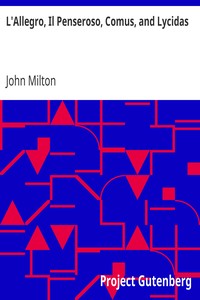L'Allegro, Il Penseroso, Comus, and Lycidas by John Milton
"L'Allegro, Il Penseroso, Comus, and Lycidas" by John Milton is a collection of poetic works composed during the early 17th century. This book features four distinct pieces: "L'Allegro" and "Il Penseroso," which present contrasting moods of joy and melancholy; "Comus," a masque that explores themes of temptation and virtue; and "Lycidas," a pastoral elegy mourning the loss of a friend. The overarching topic addresses human experiences, emotions, and the divine interplay of
fate, virtue, and mortality. In "L'Allegro," Milton celebrates the joys and pleasures of life, invoking a spirit of merriment and youthful vitality, while "Il Penseroso" explores the depths of contemplation, encouraging a reverence for wisdom and solemn reflection amid life's varied experiences. "Comus" unfolds in a dramatic narrative where a virtuous lady, lost in a dark wood, confronts the seductive enchantments of Comus, a symbol of vice, ultimately highlighting the power of chastity and virtue. Finally, "Lycidas" serves as a poignant tribute to Milton's deceased friend, contemplating the responsibilities and failings of the clergy, while expressing a hope for spiritual immortality. Together, these works offer a profound exploration of the dualities of life and human spirit, woven with rich imagery and rhetorical elegance characteristic of Milton's style. (This is an automatically generated summary.)
Read or download for free
| How to read | Url | Size | |||
|---|---|---|---|---|---|
| Read now! | https://www.gutenberg.org/ebooks/397.html.images | 111 kB | |||
| EPUB3 (E-readers incl. Send-to-Kindle) | https://www.gutenberg.org/ebooks/397.epub3.images | 112 kB | |||
| EPUB (older E-readers) | https://www.gutenberg.org/ebooks/397.epub.images | 112 kB | |||
| EPUB (no images, older E-readers) | https://www.gutenberg.org/ebooks/397.epub.noimages | 104 kB | |||
| Kindle | https://www.gutenberg.org/ebooks/397.kf8.images | 271 kB | |||
| older Kindles | https://www.gutenberg.org/ebooks/397.kindle.images | 258 kB | |||
| Plain Text UTF-8 | https://www.gutenberg.org/ebooks/397.txt.utf-8 | 88 kB | |||
| Download HTML (zip) | https://www.gutenberg.org/cache/epub/397/pg397-h.zip | 110 kB | |||
| There may be more files related to this item. | |||||
Similar Books
About this eBook
| Author | Milton, John, 1608-1674 |
|---|---|
| Title | L'Allegro, Il Penseroso, Comus, and Lycidas |
| Note | Wikipedia page about this book: en.wikipedia.org/wiki/Il_Penseroso |
| Credits | Produced by Edward A. Malone |
| Reading Level | Reading ease score: 68.6 (8th & 9th grade). Neither easy nor difficult to read. |
| Language | English |
| LoC Class | PR: Language and Literatures: English literature |
| Subject | Cheerfulness -- Poetry |
| Subject | Melancholy -- Poetry |
| Subject | Didactic poetry |
| Category | Text |
| EBook-No. | 397 |
| Release Date | Jan 1, 1996 |
| Most Recently Updated | Jan 1, 2021 |
| Copyright Status | Public domain in the USA. |
| Downloads | 369 downloads in the last 30 days. |
| Project Gutenberg eBooks are always free! | |

